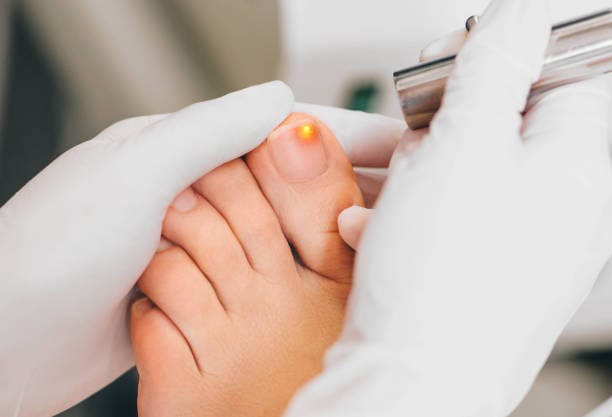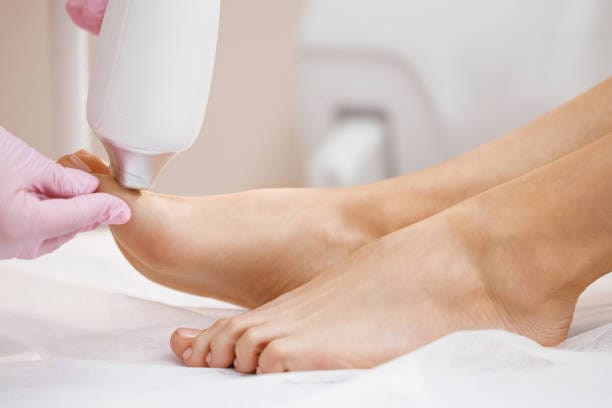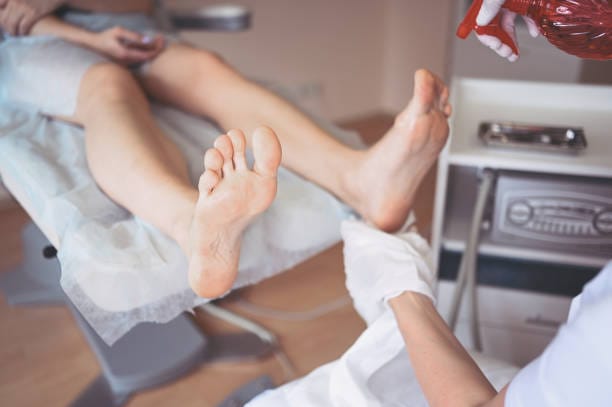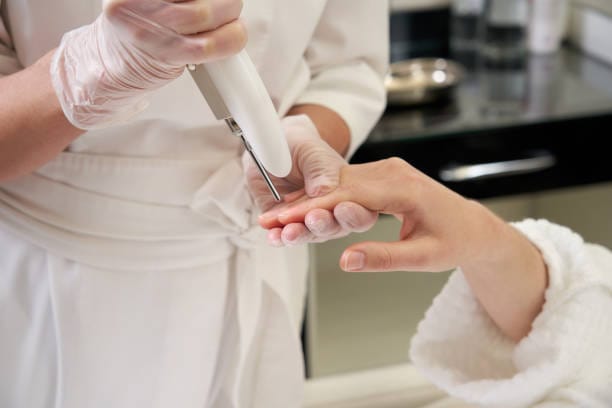Nail Fungus Laser Treatment: Is It Worth It?

Onychomycosis, scientifically known as nail fungus, is a fungal infection that affects a large number of people worldwide. Fungi invade the nails, discolouring, thickening and making them brittle: this is usually how the infection occurs. Nail fungus is not just a cosmetic issue, because it can be uncomfortable and go on to affect other nails or other parts of your body if left untreated. Since traditional treatments like antifungal creams, oral medications, and home remedies may not get the job done and aren’t always enough, many people turn to more effective measures like laser treatment for nail fungus when regular treatments don’t seem effective. If you’re still unsure about whether laser treatment for nail fungus is worth it, stick around to find your answers.
Laser Treatment for Nail Fungus: A Safe and Effective Solution
The laser treatment of nails for fungus – Miracle Treatment Nail Fungus using laser technique with glowing light energy which is focused on the fungal infection so as to eliminate it. It works by putting the laser in the nail and going in and hitting the infected nail bed where the fungus lives. The fungal cells absorb the laser energy to crack apart, and die. The infection improves over time, as the nail grows out and the area under the infected nail fills in with a new healthy nail.
Laser therapy offers many advantages over traditional treatments, so there is a good chance those who have been unsuccessful with over-the-counter remedies, prescription medications or home treatments will find clear benefits from laser therapy. Laser treatment for Nail fungus is a targeted solution intended to target the infection only, which means only to the nail, without the side effects or harming the surrounding skin or tissue, and thus it is precise, as well as a non-invasive pathway to treat the nail fungus.
Nail fungus laser treatment is a process which uses what is called a laser beam made specifically to get into the nail plate without damaging the surrounding skin or tissue. The fungal cells are destroyed with this heat from the absorbed laser energy that is turned around. The treatment is thus directed to the sites of infection, and rarely affects healthy tissue.
There are two main types of lasers used for this purpose:
1. Nd-YAG Laser: It is a wavelength that is highly effective against the fungus of the nail bed.
2. Carbon Dioxide (CO2) Laser: To attack the fungal infection underneath the surface, CO2 lasers penetrate the nail.
The lasers work by heating up the fungal cells so the infection can be killed. It is hot enough to kill the fungus without hurting neighbouring skin or nails.
Laser treatment is direct on the infected area, whereas oral meds or topical cream are less direct, less effective treatment.
Why You Should Use the Laser Treatment for Nail Fungus

1. Fast and Effective Results
The main benefit of laser treatment for nail fungus is its speed at which laser treatment can provide results. These traditional treatments — antifungal creams, or oral meds — can take weeks or even months to see any improvement. On the other hand, laser treatment for nail fungus is normally much faster, and many patients find that they can see the results from the first treatment within two to three weeks.
Treatment will cause the infected nail to grow out over time, and normal nail growth will replace that infected tissue. Results may take several months as the nail grows out but the fungus is gone very quickly however the nail grows out.
2. High Success Rate
Laser treatment is very successful for most people who did not respond to more conventional therapies. Many studies regarding laser therapy suggest that many of these infections will clear up on their own with the help of the laser, and some research has reported successful rates up to 80-90%. It’s such a good treatment that it’s a great option to try for people who have persistent or severe fungal infections that just aren’t responding to other therapies.
Laser treatment for nail fungus has proven to be very effective for many who want a permanent solution to their nail fungus problem, and there is no treatment that promises 100% success.
3. Minimal Side Effects
Laser treatment has very few side effects, which would be one of the 'downsides' to traditional treatments like an oral antifungal medication. A big list of nasty side effects, including bad digestion, nausea and headaches. Laser therapy has very few side effects, since it is a non-invasive treatment that does not involve any medicines or harsh chemicals.
Some people may feel very slight warming or tingling, which for the most part is not uncomfortable. It is meant to be precise and only target the fungal infection without doing damage to surrounding tissue.
4. Non-Invasive and Painless
Laser treatment is non-traumatic, non-invasive in itself, it does not involve incision or needles. For this reason, this is much less stressful of a treatment than any other treatment they offer. Laser treatment works immediately on the infected area where the treatment will not take time for the medication to reach the bloodstream.
It’s also quite painless. In most patients the treatment is mild, warm or tingling and it is short lasting. You won’t have to be anaesthetised, you won’t have to recover from the treatment, you can go back to doing your normal business straight away, although your toes might still be a little tender.
5. Long-Term Solution
Laser treatment for nail fungus can result in long lasting positive outcomes. When the fungus disappears, the nail starts to grow and healthy nail growth begins. It may take several months for this complete result to be seen, and most patients see fungal infection that doesn't return in the months following laser treatment.
Long term success can be ruined if your feet get dirty, but at the same time it is important to prevent these conditions leading to fungal growth, such as wearing tight sweaty socks for long hours.
How Long Does Laser Treatment Really Take?
Most people need only one to two sessions of laser nail fungus treatment. The number of sessions depends on how serious the infection is and how the person reacts towards the treatment. In some cases, additional sessions may be needed to remove the fungus, as they can lead to more serious forms of infection or fungal growth.
The length of each session, which will generally vary from 20 to 30 minutes, depending on how many nails of that area are covered at any given point in time. The healing takes place and the fungus is completely done.
The treated nail will eventually start to grow out and replace a healthy fungus free nail. But although symptoms vary from patient to patient, some patients see improvements within a few weeks, while others take a few months for their nails to grow out completely.
Laser Treatment: What to Expect and After Care.

Before the Treatment
Before treatment with laser, you will first be consulted with a medical professional regarding nail fungus. At this appointment, the professional will review your medical history and determine if laser therapy is right for you and will perform a check up on your nails. If you have any underlying conditions — such as diabetes, for example — that may compromise your ability to heal, they may advise you to take other precautions or an alternative treatment.
During the Treatment
The provider will place a handheld laser device over the affected nails and treat nails with laser. The whole procedure shouldn’t hurt and feeling a bit warm or tingling is normal though. The whole treatment takes 20 to 30 minutes.
After the Treatment
The procedure can be carried out with you returning to normal activities immediately afterwards. You may be told to keep your feet away from things like tight shoes that will lead you to constantly expose your feet into things that'll make your feet wet and sweaty, to increase your chances of getting the infection again.
Slight redness or swelling at the nails may occur but it should ideally go away quite soon. The nail grows out over time, the fungus will clear up. The infection should be ended, but it may take several months of growth for the nail to come back to normal; completely and fully healthy.
Nail Fungus Laser Treatment – Should you get it?
If you are someone who has already tried various treatments that failed, laser treatment for nail fungus may be the perfect choice. However, if you’ve been facing severe fungal infections, the advanced Laser treatment for Nail fungus may be a better, more lasting solution.
Some people may benefit from Laser treatment for Nail fungus while others may not. However, this treatment is not suitable for everyone, for example those with a pregnancy or photosensitivity condition. A laser treatment should always be brought up and talked to over with a healthcare provider to find out whether it’s the right one for you.
How Safe Is Laser Treatment for Nail Fungus, and What Are Its Limits?
However, there are several risks and limitations associated with laser treatment for nail fungus and you need to know whether it is right for you. Every medical procedure carries with it risk, and knowing those risks will help you to decide whether or not laser therapy is right for you.
1. May not be effective in Severe Cases.
Laser treatment for nail fungus cures most cases. But this isn’t always as fast or successful for those with very bad or long-standing infections. While the laser treats the fungi on the surface of the nail, which are more easily removed, even during one session, it may take a few more sessions to fully fight the infection. You might need to go for additional sessions, but that success rate may come out different.
2. Pain and Discomfort
Usually it’s quite painless, but you’ll most likely feel a tingling or warm sensation. depending on how many nails you have to treat, how deep the infection is, the discomfort may vary.
3. Post Treatment Care and Follow Up section.
If you had a Laser treatment for Nail fungus, you need to see your doctor to follow up just to make sure that that infection doesn’t come back. The treatment does kill the fungus in the nail, but if you’re wondering that it prevents recurring infection, you might get disappointed. Sometimes patients can get recurring fungal infections if they are not taken care Of carefully after treatment.
Also, it's important to remember nail hygiene: do not damage your nails, avoid getting them wet, refrain from tight shoes and use antifungal potions. The fungal spores are everywhere and you can go back and get re-infected any time.
4. High Cost
Generally speaking, Laser treatment for Nail fungus tends to be more expensive than normal treatment involving the use of topical antifungal creams or oral medications. Where you go, how severely infected or how many sessions you require, all these factors determine the cost of the Laser treatment for Nail fungus. While the treatment has great treatment benefits, its price may be a barrier for those who are on a budget.
Nail Fungus Laser Treatment: How to Prepare?
Here are a few simple steps helpful to follow to ensure that you are ready for laser treatment for nail fungus to run smoothly and efficiently. Here's a breakdown of what you need to do before your appointment:
1. Consultation: Then you will have the consultation with the medical professional before the treatment. During this appointment your doctor will review your medical history, examine your nails, and then decide whether laser treatment is the best treatment for you.
2. Avoid Nail Polish: Take off the nail polish before your appointment. Nail polish can prevent the laser from working, so get your nails ready and any products that you might put on your nails should be removed.
3. Foot Hygiene: If good foot hygiene has not been practiced, treatment is negatively affected. First, have your feet cleaned before the session in case there’s dirt or fungus on the surface of your feet.
4. Comfortable Clothing: You'll want to wear comfortable clothing, but the treatment is non-invasive, shall take five minutes, and is done on the feet. Something easy to take off might be a good idea for those socks or shoes to come off.
Nail Fungus Laser treatment: What to Expect

Laser treatment is a relatively simple, quick and non-invasive procedure. If you're considering laser treatment for your nail fungus, here's what you can expect during your appointment:
1. Initial Consultation: Your healthcare provider will examine the severity of your nail fungus on your first visit and will talk with you about your medical history and what treatment course is best for your situation. This could mean this will also include how many sessions are needed.
2. Preparation: If you're planning to remove nail polish or ointments from the area on the day of procedure that prevents the laser from reaching your nail and spoil the intended benefit, your nails are thoroughly cleansed to remove any external dirt or fungus.
3. Treatment Procedure: It is done in a comfortable, well-lit place. A handheld laser device that will fire energy into the affected nails is used by the provider. You’ll feel a warming or tingling sensation as the laser targets the fungus under the nail surface. Although most patients can take it very well, the treatment is easily tolerated and usually is very well tolerated
It'll usually take around 20 to 30 minutes. The procedure is carried out with almost no anaesthetic and suffering minimal downtime, with most patients requiring no anaesthetic or numbing at all.
4. Post-Treatment Care: The treatment is something you are able to go on doing normal activities afterwards. It doesn't seem to be too bad to recover from it, you recover from them fast and most patients are walking around and wearing shoes right away. You might look at it, and notice that there is some slight redness around the nail that has been treated, and that will go away within a few hours.
How long can I expect results?
Nail fungus laser treatment — how long will it be until you can see the results? How long it takes for you to see results will vary from person to person, but most people will begin to feel better within a few weeks. The time it takes for the nail to grow out and the time it takes for the infection to clear itself up completely are two different things.
Usually, the nail in that spot will begin to grow into a new and healthier nail. Eventually the new nail will grow and fill in for the damaged tissue. The nail often takes several months to fully regrow and not be infected anymore.
Why Choose Revitalize London.
Revitalize London offers advanced laser treatment for nail fungus using the latest technology and friendly staff. We are committed to providing targeted, effective care to you. Our clinic is so warm and welcoming that we want to get you comfortable.
If you’re looking for someone you can trust to treat your nail fungus, then Revitalize London is the place to be, as we concentrate on the results, the patient care and the technology. Whether you’ve been playing healthy or experiencing a mild infection or more aggressive case, we are here to help you get the best results possible.
Conclusion
Nail fungus Laser treatment finally offers a quick, efficient and minimally invasive treatment method for a problem that affects so many people all over the world. It is extremely successful, has little or no side effects, is fast, and therefore a great substitute for those people that have problems with bad fungal infection already. Revitalize London is able to get you here so we can give you the best care that we can to not only clear nails but hopefully get you healthy nails again.
